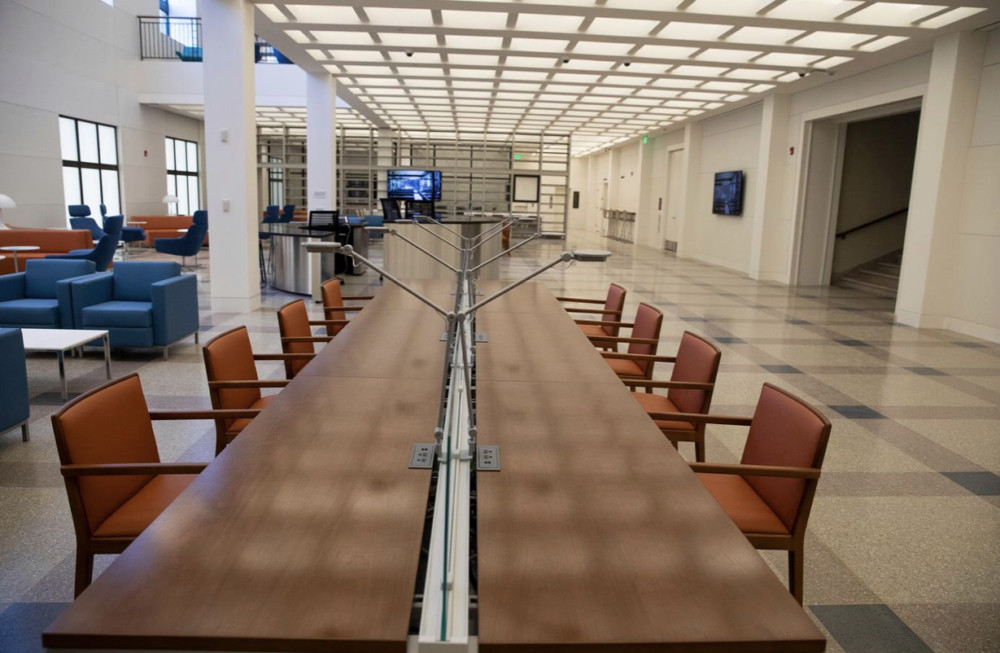By Diane Mastrull
The Philadelphia Inquirer
WWR Article Summary (tl;dr) A Philadelphia library has become much more than a home for books. At the “BRIC” center at the Free Library in Philadelphia, a conversation is welcome especially if you have a good business idea!
The Philadelphia Inquirer
In the Free Library’s new Business Resource and Innovation Center, you can be as noisy as you want, even eat there. You can get free headshots taken for your LinkedIn profile, or a video of you practicing pitches. Or take a class on how to write a business plan.
The BRIC, as it’s more commonly called, “is not your mother’s library,” said library supervisor Caitlin Seifritz. Nor is it a standard millennial-era co-working space — you know, the ones with kegerators and Ping-Pong tables.
“The kegerator would get us in trouble with ancient city policy, so we had to pass on that one,” said Rebekah Ray, administrative librarian at the BRIC, while acknowledging that the service desk “does make an excellent bar for special events.”
Still, library officials hope the BRIC will encourage the kind of collaboration, innovation, and networking popular at communal workspaces, with one key difference: Its offerings are free.
That goes for access to databases on patents (the BRIC is a designated patent and resource center of the U.S. Patent and Trademark Office, one of only three in Pennsylvania), market trends, and funding sources for nonprofits, along with the guidance from experts to mine those.
“There’s no paying me $500 an hour like you would an attorney,” said Sharyl Overhiser, the BRIC’s patent librarian.
Said Gillian Robbins, business services supervisor: “We’re not trying to make you buy anything. We’re not making you pay anything. We’re just truly here to help and assist you.”
And to fulfill a rather ambitious mission.
“Really, the goal of the BRIC is to end poverty in Philadelphia,” Ray said, adding that the path they have identified to accomplish that is by serving four constituencies: entrepreneurs and small-business people, nonprofit leaders and managers, inventors, and job seekers/career changers.
They are groups that the Free Library has been serving “in kind of a haphazard way across our system. So we wanted a place to centrally locate the services,” Ray said.
The BRIC is one of three new public spaces created at the Central Library on the Parkway as part of a $35 million, 15-year project to re-imagine a 92-year-old Beaux Arts building trying to remain relevant.
The two others are the Robert and Eileen Kennedy Heim Center for Cultural and Civic Engagement and the Marie and Joseph Field Teen Center. Their public debut, in the rear of the library that once housed more than 800,000 books in six levels, is Friday.
As programs — and the partnerships with business-support organizations that are needed to provide them — reach critical mass, “our intention is to spread them out” to the entire 54-library system, Ray said.
The early reaction in the city’s start-up community is elation.
Jeff Friedman, cofounder of OpenAccess, a Philadelphia nonprofit dedicated to growing the tech and innovation ecosystem with a diversity, equity, and inclusion ethos, praised the BRIC as a welcome effort “to democratize resources that new businesses need to start, stay, and grow” in the city.
“Providing such resources in a more egalitarian fashion is critical to our diverse city’s economic growth, as research shows that companies in the top quartile for gender or racial/ethnic diversity are more likely to have revenues that exceed national industry medians,” Friedman said.
Ben Franklin Technology Partners’ director of strategic initiatives, Margaret Berger Bradley, described the BRIC as “a perfect modern Free Library resource.”
“If Ben Franklin first envisioned we share books, now why wouldn’t we use the Free Library to share brain trust and expertise of all sorts?” Bradley said. “Even with the rich array of business resources we have in Philadelphia, BRIC remains one where, by definition, any Philadelphian is as welcome as any other.”
At 56, Karin Copeland, former executive director of the Arts+Business Council of Greater Philadelphia and an industrial engineer by training, started a new business in October called Create X Change, an interactive business design studio. She consulted with the BRIC team as it put the finishing touches on the resources center.
“It’s an exciting time for Philadelphians. There is a much lower barrier to entry now to start a business because of the internet and iPhone,” Copeland said. “If you’ve got an iPhone and an idea, connect with the Business Resource and Innovation Center and you are well on your way to finding your audience.”
Ray said the BRIC was “inspired by” the British Library Business and IP Center, which she visited last year and learned was modeled after a previous iteration of the New York Public Library’s Science, Industry and Business Library. Unlike the Philadelphia Free Library, they are limited-access libraries, Ray said.
Use of conference rooms, classrooms, and service spaces in the BRIC will be “managed,” thus restricted to “registered” clients, Ray said. Those will be people who sign in and agree to certain “terms and conditions,” she said.
Although the BRIC represents a lot that has changed in Philadelphia’s business community over the past 10 or 15 years — including the proliferation of shared workspaces and curated resources available digitally — in a sense it’s what libraries have always been, Ray said.
“The library was the original co-working space and we’re just carrying on that tradition — but adding service to it,” Ray said.
And eliminating the “no talking” rule.
“There will be no shushing,” said Overhiser, the patent librarian.














































































































































































































































































































































































